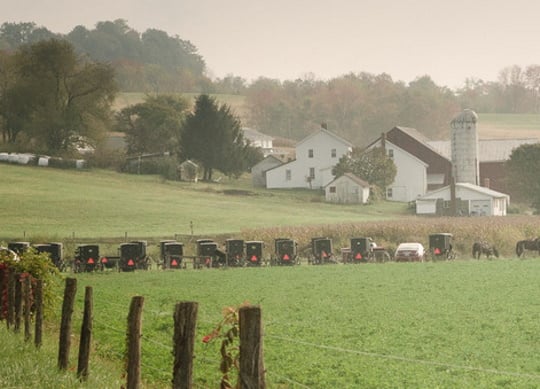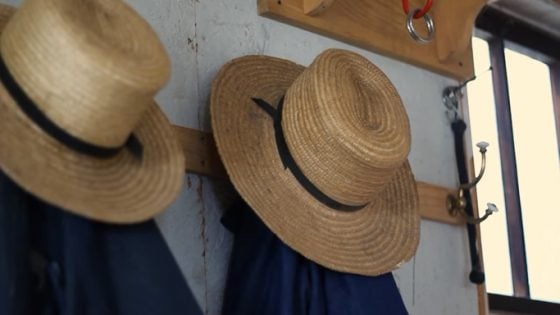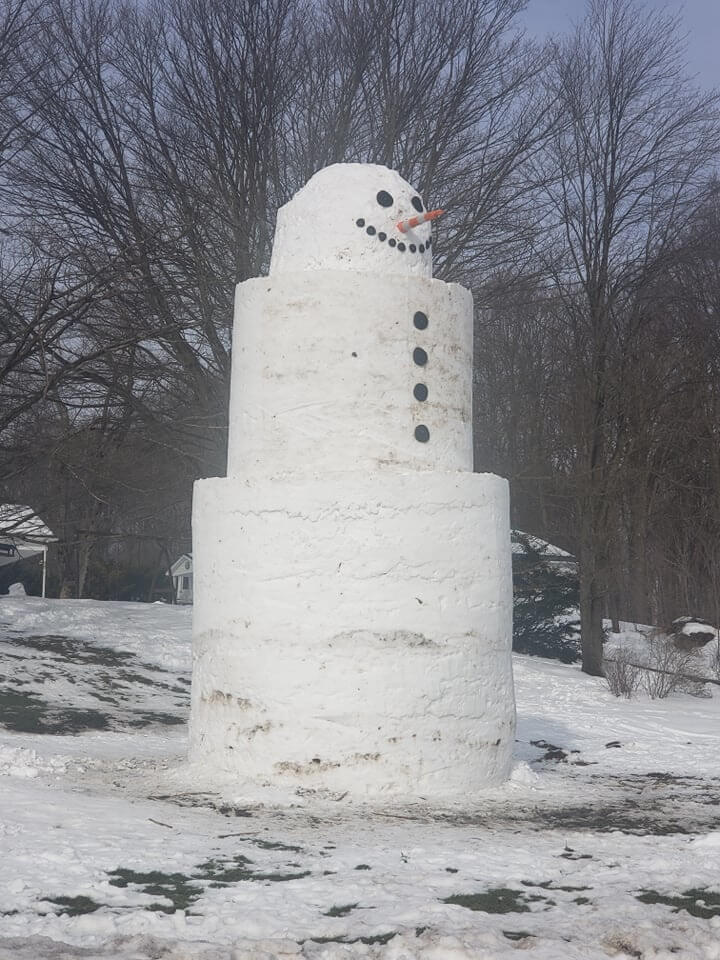3 Interesting Facts About Holmes County Amish Weddings
In the latest edition of the Journal of Plain Anabaptist Communities (JPAC) we find an article by Henry Troyer titled “Change and Continuity in Amish Wedding Dates in the Holmes County, Ohio, Settlement“. I found several interesting facts in Troyer’s piece I’d like to share with you, concerning Holmes County wedding customs. Let’s start with the main point of the paper:
1. Over the past 100 years, the wedding schedule has completely flipped
Troyer explains that Amish weddings have traditionally been held in winter months, with a December peak (I’m not sure what is considered “winter months” here, as December is technically more an autumn month than a winter month, going by the calendar). We might simply take this to mean “colder months”.

There are a couple of reasons for this. One is that with a farming schedule, the colder months are among the lightest in work responsibilities, thus allowing farmers to attend.
Another concerns food preservation. It’s easier to keep the large amounts of food that must be prepared beforehand during colder times of the year.
Over the decades, farming in Holmes County has declined as an Amish occupation. At the same time, mechanical refrigeration has become common. The upshot is that hardly any weddings are held in December in Holmes County, with the vast majority now occurring during the warmer months. For the period 2008-2019, considering 1,240 weddings, Troyer found the most popular month to be May, followed closely by June. A miniscule amount occur in December now – less than 1%.
By comparison, in Lancaster County the story appears to be quite different, with a greater adherence to a traditional wedding schedule. We’ll hopefully hear more about that here in a future post.
2. New Order Amish hold all their weddings on Saturdays
No reason is given in the paper for this New Order custom. But it marks them as different from the rest of the community’s Amish, whose most common wedding day is Thursday.
Why Thursdays? Citing Stephen Scott, Troyer explains that no one seems to know why exactly – but a reasonable explanation has at the least been attached to the practice:
In the distant past, weddings were sometimes incorporated into the regular Sunday worship service, but that no longer seems to occur. No one seems to know exactly why Thursday is the dominant day for weddings but a compelling rationale has been constructed. The day before a wedding is spent preparing a large amount of food for the guests. The operation starts early in the morning and involves not only the family of the bride but also certain neighbors and relatives who are recruited to help. A major all-day cleanup operation takes place the day after the wedding. It is obvious then that Mondays and Saturdays would not make good wedding days, because either the food preparation day before or the cleanup day after would fall on a Sunday, and the Amish are quite serious about keeping Sunday as the Lord’s Day (Scott 1998). (pp 96-97)
Troyer notes that it is unclear why Wednesdays and Fridays are not used as wedding days, suggesting it may simply be due to tradition.

One other day of the week has gone unmentioned. In the past, a substantial number of weddings were held on Tuesdays (close to 30%), but that has declined to account for perhaps 6% of all weddings today.
3. Married couples-to-be are less secretive about it nowadays
This one may apply to more than just Holmes County. In the past, secrecy surrounded an Amish couple’s decision to wed. The information was kept tightly within a small circle of families. This resulted in wondering gossip among those in the community not “in the know.”
Troyer explains that “in recent years, significant changes have occurred in this premarital dynamic.” Nowadays, news of a planned wedding becomes more widely known, even up to a year beforehand.
The article is worth reading in full. It’s one of this edition’s briefer pieces (eight pages) but gives a nice explanation of Amish wedding customs, plus some further analysis on themes including Amish customs changing over time.





Amish weddings
Thank you for information. I think Mondays were not a good day for weddings because that is wash day lol. Really enjoyed learning their way of life. So beauitful farms I would love to live in a place like that if it wasn’t for the fear of tornados. Much appreciated your report on wedding days thank you.
Glad you liked it Diane. I enjoy learning the reasons behind customs like that – assuming people know them. Sometimes a thing is done the way it is done for so long, that the rationale passes out of living memory. But I find the explanation for Thursday weddings (and Tuesday to a lesser degree) plausible.
Would amish consider a forced marriage valid?
Hi Erik, i was wondering if you or anyone else would be able to find this out for me. I haven’t had any luck trying to figure this out. Im interested in joining the Amish but im divorced. The marriage was forced. He was very physically abusive to me. I dont want to go to much into detail but he had assaulted me and threatened me with more violence if I didnt marry him.
I know Amish are against divorce but would that even go for a forced marriage? I didnt know at the time I couldve had the marriages annulled to to the threats but I’d never heard of an annulment before so I got a divorce instead. There are no children. My grandma got me out within a couple weeks of the marriage.
Id hate for that to stop me from being able to join or if I did remain single..
Facts about Amish weddings
Erik,
This is very interesting and informative about Holmes County and other Amish weddings. The Lord’s Day is important, so I agree with this as well.
Please keep up the good facts about the Amish, your work, and dedication is very instrumental!
God Bless You Always!
Bros. Arthur
I appreciate that, Arthur.
Amish Weddings
I don’t know if this is the reason as to why the Amish have weddings on Thursday or not, but many many years ago Thursday was known as the maids day off. This was a practice among those who hired domestic help. I don’t know how many Amish girls would’ve been hired as servants years ago, but I’m sure some were. This was why many churches held services on Thursday evenings. The church I belong to (Apostolic Christian) held services on Thursdays until they were changed to Wednesday. Weddings in our denomination have been incorporated into the afternoon service on Sundays.
Here too...
The practice of weddings on Tuesday and Thursday was already common in Alsace (France) for our Amish/Mennonites. I see that this practice, like many others, has continued on your side of the Atlantic.
For winter weddings, it was a practice of the farming community in general, not just the Anabaptists.
I am from Austria and our weddings also traditionally took place on Tuesdays and Thursdays. I think the reason for this was because the Catholic population had to fast on Wednesdays and Fridays. Some people still do that today, for example my family does not eat meat on Fridays, unless it is a church holiday.